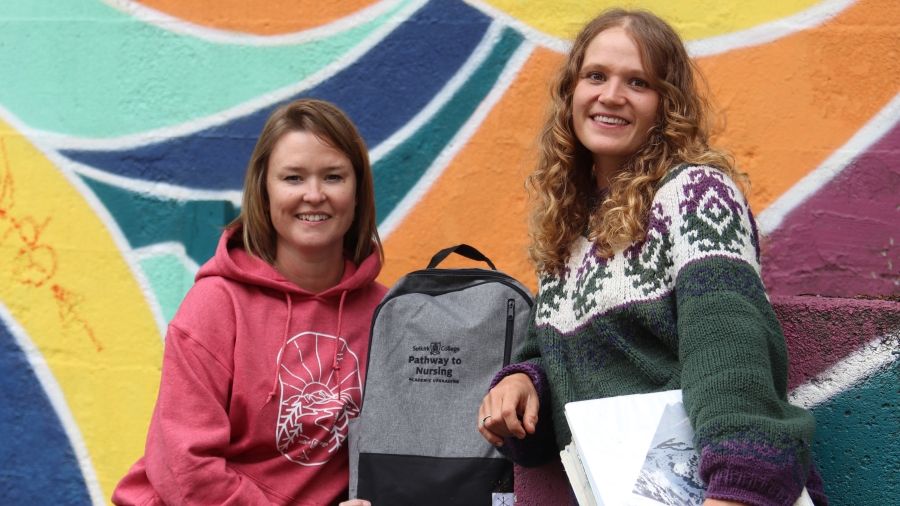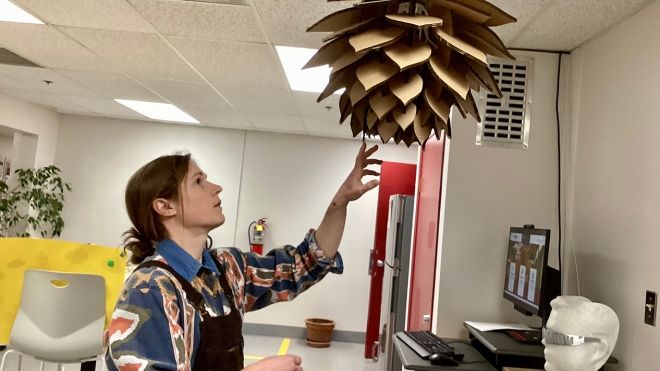Digital Fabrication and Design - Diploma
Overview
Agile, Collaborative and Multi-faceted Learning
The Digital Fabrication & Design Program equips students with in-demand skills, emphasizing hands-on expertise in emerging digital fabrication technologies, advanced design and the cultivation of a global mindset.
The program prepares students to be adaptable and innovative makers, ready to thrive in a wide range of rapidly evolving industries.
Creative and Technical Problem-Solving
Through collaboration, ideation and iteration, making, prototyping and testing, students apply technology to solve complex problems. Students learn and explore through design challenges, field trips, industry collaborations and a capstone project.
With access to state-of-the art computer labs, makerspaces, technology and trades centres, student learning includes but is not limited to:
- Design for advanced manufacturing
- Traditional fabrication shop and safety practices
- 3D scanning and reverse engineering
- Rapid prototyping and design verification
- 3D computer aided design (CAD) and manufacturing (CAM)
- Additive manufacturing (3D printing)
- Subtractive manufacturing (CNC machining)
- Entrepreneurial studies
- Sustainable product design
- Emerging technologies
Program Outcomes
Upon successful completion of this program, students will be able to:
- Apply efficient computer-aided design workflows
- Apply 3D-scanning methods and processes for reverse engineering, quality control and metrology
- Apply subtractive and additive manufacturing techniques and efficient workflows for rapid prototyping
- Use current and emerging technologies and recognized best practices
- Apply project planning and evaluation skills
- Operate shop tools and digital fabrication equipment
- Explain terms, concepts and processes of digital fabrication
- Communicate effectively and efficiently in various formats to a variety of stakeholders, consistent with industry expectations
- Apply emerging problem-solving skills
- Demonstrate developing collaborative skills
- Demonstrate developing critical and creative thinking skills
- Conduct themselves in a professional and ethical manner in academic and work-related environments
Admission Requirements
In addition to meeting the general admission requirements to Selkirk College, as outlined in Policy 8611: Admission, applicants to the Digital Fabrication and Design Program must meet the following requirements to be considered fully qualified:
- Math 11 (Foundations or Pre-Calculus) with a minimum of 73% or higher
- English 12 with minimum of 67% or higher
- Completed applicant information questionnaire
- Note: Recommended but not mandatory: Physics 11 with a minimum of 67% or higher
No additional requirements in this program.
APPLICATION PROCEDURE
1. Before an applicant's file is considered to be complete, the following must have been received by the Admissions office:
a) Completed application form.
b) Official transcripts of high school grades (an interim statement of grades is acceptable if applicant is currently a student). Photocopied transcripts are not acceptable unless notarized or submitted directly from the school to Selkirk College.
c) Official transcripts of all post-secondary education grades. Photocopied transcripts are not acceptable unless notarized or submitted directly from the school to Selkirk College.
d) Applicant information questionnaire.
2. Students wishing to enroll in the Digital Fabrication and Design Program on a part-time basis, may do so providing the same entry requirements as full-time students as stated in Part 1.A have been met. Part-time students are only accepted if space is available after all full-time students are scheduled.
A. PROMOTION
1. Admission to a given semester requires completion of all required courses with a minimum cumulative G.P.A. of 2.0 and no more than one (1) failure grade in the previous semester courses. Promotion from the first year to the second year also requires a minimum G.P.A. of 2.0 and no more than one failing grade in first year courses. Any student with more than one (1) failure must have the School Chair's approval to progress to the next semester. Students receiving a final grade of "F" in a prerequisite course will not be allowed to register in a subsequent course requiring that prerequisite
2. To be qualified for admission into a course which stipulates a prerequisite, a minimum grade of "C" must be achieved in the prerequisite course, unless otherwise specified.
3. Normally, two failed attempts in a required course is cause for withdrawal from the program. A third attempt in the same course may be made with the permission of the School Chair.
B. GRADUATION
In order to qualify for the Selkirk College Digital Fabrication and Design Diploma, a student must complete all of the following courses with a minimum Final Grade of "P" in each course and an overall GPA of 2.00 or better.
Courses
DFAB103 - Design for Digital Fabrication 2D
DFAB 103 Design for Digital Fabrication 2D will focus directly on a variety of 2D design applications. Students will gain knowledge in communicating design concepts using sketching, graphics, renders, and 2D technical drawing standards.
DFAB104 - Design for Digital Fabrication 3D
DFAB 104 Design for Digital Fabrication 3D. Students will learn how to design for digital fabrication. Emphasis will be put on designing functional parts following industry design standards. This course will focus directly on 3D CAD applications and design practices. Students will gain knowledge in solid and parametric modeling as well as the migration between various workflows and approaches.
DFAB111 - Introduction to Desktop 3D Printing
DFAB 111 Introduction to Desktop 3D Printing introduces students to standard operating and maintenance procedures for common desktop 3D printing machines. Students will receive hands-on training with 3D machines using plastics and plastic alternatives.
DFAB112 - Traditional Fabrication Principles
DFAB 112 Traditional Fabrication Principles introduces students to traditional fabrication processes in relation to equivalent digital fabrication processes. Students will learn standard shop safety practices, measurement techniques, layout and dimensioning standards, how to read and interpret drawings, and applied math skills required for manufacturing. Students will have an opportunity to apply these principles in DFAB 113.
DFAB105 - Design for Additive Manufacturing
DFAB 105 Design for Additive Manufacturing. Design criteria for a variety of additive manufacturing processes will be covered in this course. Students will gain additional knowledge in solid and parametric modeling as it pertains to additive manufacturing design criteria. A variety of design techniques for additive technologies including stereolithography (SLA) and fused deposition modeling (FDM) will be explored.
DFAB106 - Additive Manufacturing I
DFAB 106 Additive Manufacturing I develops student knowledge and skills gained in DFAB 111 related to standard operating and maintenance procedures for additive manufacturing machines, process, and workflows, including safe operation of all systems. Students will receive hands-on training on a variety of additive manufacturing technologies including stereolithography (SLA) and fused deposition modeling (FDM) machines using plastics and plastic alternatives.
DFAB107 - Design for Subtractive Manufacturing
DFAB 107 Design for Subtractive Manufacturing. Design criteria for a variety of 2D subtractive manufacturing processes will be covered in this course. Students will gain additional skills in solid and parametric modeling as it pertains to subtractive manufacturing design criteria. Students will learn a variety of design techniques for subtractive technologies including 2D CNC milling, routing, and laser cutting.
DFAB108 - Subtractive Manufacturing 1
DFAB 108 Subtractive Manufacturing 1. In this course students will learn standard operating and maintenance procedures for subtractive manufacturing machines, processes and workflows, including safe operation of all systems. Students will receive hands-on training on a variety of subtractive manufacturing technologies specifically, 2D CNC routing, milling, and laser cutting for wood, plastic, and other material mediums.
DFAB113 - Traditional Fabrication Practices
DFAB 113 Traditional Fabrication Practices provides students with practical fabrication experience in metal. Students will gain hands-on experience in the application, maintenance, and procedures for the use of hand tools, power tools, layout tools and equipment, drills, drill presses, lathes, and milling machines.
DFAB201 - 3D Scanning and Reverse Engineering
DFAB 201 3D Scanning and Reverse Engineering. In this course students are introduced to reverse engineering where they will learn a variety of techniques including photogrammetry, LiDAR, structured light and machine probing. Students will then focus their learning on scan to CAD, metrology processes and product analysis.
DFAB202 - Subtractive Manufacturing 2
DFAB 202 Subtractive Manufacturing 2. In this course students further their training in CNC manufacturing, building on the knowledge gained in DFAB 108 with a deeper dive into CNC stepping, multi-tool paths, jigging, flipping, and surface contour machining. Students are introduced to sheet metal design in CAD, waterjet cutting, forming and bending techniques. This course explores design considerations, design constraints, safe machine operation, and tool selection for subtractive manufacturing.
DFAB204 - Computer Aided Design and Rapid Prototyping
DFAB 204 Computer Aided Design and Rapid Prototyping. Students will receive an introduction to advanced surface and solid CAD modelling software. Use CAD to create complex solid and surface models. Translate design files between multiple CAD softwares. Explore the relationship between design intent, form giving, and formal resolution through a rapid prototyping exercise.
DFAB205 - Entrepreneurship
DFAB 205 Entrepreneurship supports students to identify and respond to a market need by bringing a marketable business idea to life. By simulating a start up environment, students are challenged to explore team-based problem solving, ideation, and business plan development culminating with a pitch in which students present their startup idea for feedback.
DFAB206 - Molding and Casting for Advanced Manufacturing
DFAB 206 Molding and Casting for Advanced Manufacturing introduces students to the fundamentals of design and implementation of advanced manufacturing. Emphasis is on practical skills including designing for and implementing projects utilizing injection molding, 3D printed mold making and various other molding and casting techniques.
DFAB207 - Advanced CNC Technologies
DFAB 207 Advanced CNC Technologies will introduce students to machining metal using various tools including CNC machining and turning centers. Students will learn standard setup and operation techniques for various machines, how to implement CAD/CAM software to generate the appropriate tool paths, and how to test their learning through CNC simulation before setting up and running the program on physical machines.
DFAB208 - Sustainability and Adaptive Design
DFAB 208 Sustainability and Adaptive Design allows students to apply digital design and fabrication techniques within the context of sustainable product design and adaptive design. Students will complete a series of projects using tools such as 3D solid and surface modeling, 3D scanning technologies, and experimental approaches to digital model generation. Digital models will be made physical through a variety of fabrication technologies which can include 3D printing, CNC milling, casting, molding and laser cutting.
DFAB209 - Capstone
DFAB 209 Capstone provides students with the opportunity to employ their cumulative skills and talents in a chosen area of focused study. Each student must declare an area of interest that will be the basis of a unique product, requiring a series of scheduled tasks to complete.
Tuition & Fees
Domestic
International
All amounts are estimates and are subject to change. Tuition amounts are based on a full-time course load. Please note that many programs have additional costs beyond those listed here. For more information, please visit Tuition & Fees.
Policy
Effective Term:
FallEffective Year:
20230801Advanced Standing:
See Policy 8614
.
Re-Entry Instructions:
1. Re-admission to the program is only permitted when space is available.
2. Students who must interrupt their program may apply for re-admission within one year of departure or with the permission of the School Chair.
.
Assessment:
Grading will be based on the grades specified in the Standard Academic and Career Grading Table. To view the grading tables, see Policy 8612: Grading.
.
Grading Table:
Standard Academic and Career Programs
Types of Assessments:
1. Assessment Rewrites
a) Students who are absent from an examination due to illness, accident or family emergency may apply to the instructor for permission to be assessed at an alternate time.
b) Supplemental/re-writes must be written within the time period indicated by the instructor.
.
Other Regulations:
Cheating and Plagiarism
a) Cheating and plagiarism will not be tolerated. Please refer to College Policy 8618 Cheating and Plagiarism.
.
Find Out More
We look forward to connecting with you! Fill out this form and we'll reach out to you.



